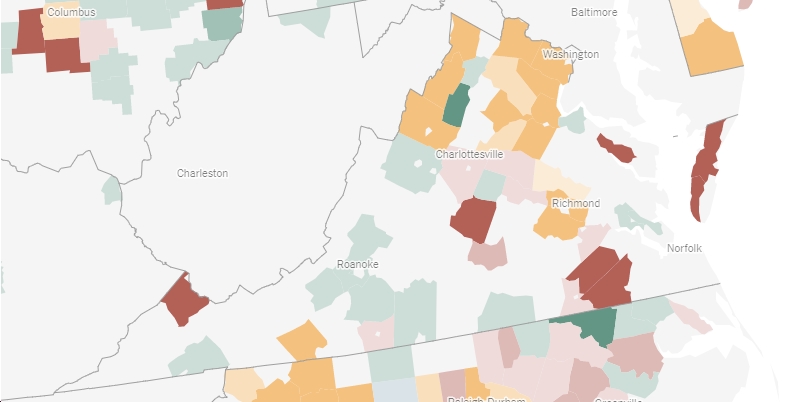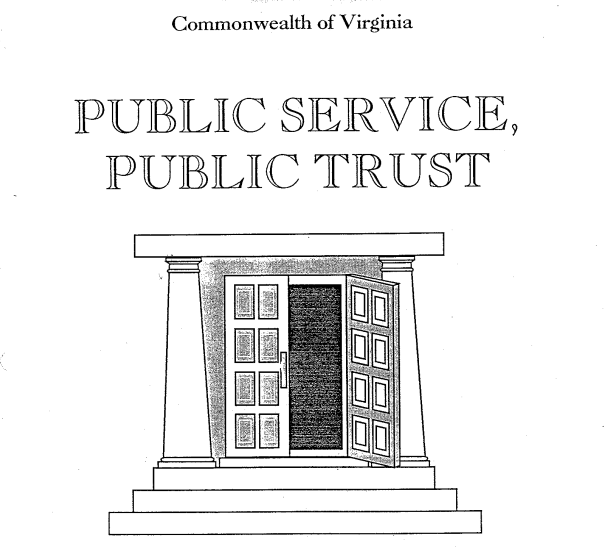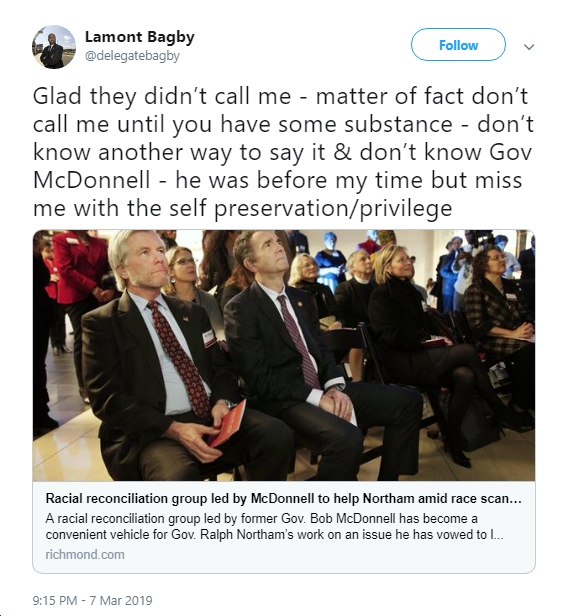And yet ANOTHER poll!
Northam Leads in Close Race
Tuesday, September 26, 2017
Democrat gains support in GOP-rich parts of Commonwealth
West Long Branch, NJ – Democrat Ralph Northam currently holds a 5 point lead over Republican Ed Gillespie in the race for Virginia governor. The Monmouth University Poll finds that Northam has gained support in the western half of the Commonwealth, an area that is traditionally a GOP stronghold. The Democrat, who is a pediatric neurologist as well as the state’s current Lieutenant Governor, holds a significant advantage on being seen as better able to handle the issue of health care, which voters identify as one of their top concerns in this election.
Currently, 49% of likely voters support Northam and 44% support Gillespie. Libertarian candidate Cliff Hyra gets 2% of the vote and 4% are undecided. Two months ago, Monmouth found a tied race at 44% each for Northam and Gillespie, with Hyra at 3% and undecided at 9%. Compared to July, Northam has increased his support particularly among voters age 50 to 64 (up 12 points to 50%), women (up 7 points to 57%), and white voters (up 7 points to 43%).
“It appears that many previously undecided voters have moved into the Democrat’s camp,” said Patrick Murray, director of the independent Monmouth University Polling Institute.
There are some interesting regional differences in current vote intentions. Northam has a 17 point lead over Gillespie in Northern Virginia (56% to 39%) and a 9 point lead in the eastern part of the Commonwealth (49% to 40%), both of which are in line with July’s results. The race remains virtually tied in Central Virginia, with a negligible 49% to 48% result in Northam’s favor whereas Gillespie had a 2 point nominal edge in the prior poll. The Democrat has made up significant ground, though, in the western half of the Commonwealth where he trails the Republican by only 7 points (50% Gillespie and 43% Northam). This area is a traditional GOP stronghold where Gillespie held a sizable 18 point advantage just two months ago.
“Northam may not have quite the level of support in Northern Virginia as current governor Terry McAuliffe did in his 2013 race, but he has the potential to outperform the incumbent Democrat’s showing in the more conservative western part of the Commonwealth. The fact that Republicans once courted Northam to switch to their party probably doesn’t hurt his credibility with that electorate,” said Murray. Four years ago, McAuliffe won Northern Virginia by 22 points (58% to 36%) but he lost the western part of the Commonwealth by a nearly identical margin to Republican Ken Cuccinelli (36% to 57%).
In terms of issues driving this campaign, health care (22%) and jobs and the economy (22%) continue to be the predominant concerns for voters in this race. The next tier of important issues include education (14%), taxes (9%), and illegal immigration (9%).
Voter opinion is divided on which candidate would best handle the top two issues, but the Democrat has a much stronger advantage on health care than the Republican does on jobs and the economy. Specifically, when asked who is likely to do a good job on health care, 45% say only Northam, 29% say only Gillespie, 7% say both, and 12% say neither. When asked who is likely to do a good job on the economy, 38% say only Gillespie, 33% say only Northam, 14% say both, and 8% say neither.
“Anxiety about health care has become a predominant public concern across the country. If Washington Republicans manage to repeal Obamacare this week, they could end up handing Democrats a huge advantage in the Virginia governor’s race,” said Murray.
Northam also has a strong advantage on education, a perennial issue in the Commonwealth – 45% say he would do a good job on education compared to 28% who prefer Gillespie. Gillespie has a smaller advantage on taxes – 40% say he would do a good job compared to 33% who prefer Northam. There is no clear edge on the issue of illegal immigration – 36% prefer Gillespie and 35% prefer Northam. Likewise, handling the state budget is not a breakout issue for either candidate – 39% prefer Gillespie and 33% prefer Northam – and the same is true for transportation where 29% prefer Northam and 27% prefer Gillespie.
The Commonwealth has faced a soul-searching debate around what to do with Confederate monuments and voters are divided on who would better handle this issue – 31% say Northam, 29% say Gillespie, 7% say both, and 18% say neither. When it comes to the larger issue of race relations, though, Northam has the edge – 37% prefer the Democrat, 22% prefer the Republican, and 13% say both would do a good job, while nearly 1-in-5 Virginia voters (18%) say neither candidate would do a good job handling race relations.
The GOP nominee has been trying to gain an edge by painting his opponent as soft on crime and opposed to new energy infrastructure such as the Atlantic Coast Pipeline. Gillespie does have an advantage on both these issues – 35% prefer him on crime compared to 27% for Northam and 35% prefer Gillespie on energy infrastructure compared to 29% for Northam. The problem for the Republican is that only 4% of voters say crime is the most important issue for them and just 2% say the same about energy infrastructure.
Both major party candidates have become better known since the summer, but opinion of the Republican remains slightly more negative than for the Democrat. Specifically, Gillespie is viewed favorably by 42% of likely voters (which is up from 36% in July) and unfavorably by 31% (which is up from 20% two months ago). Northam, on the other hand, is viewed favorably by 45% of the electorate (which is up from 38% in July) and unfavorably by 27% (which is up from 16% two months ago). Just 13% of voters have formed an opinion of Hyra (4% favorable and 9% unfavorable).
Most Virginia voters say this year’s gubernatorial contest has been largely positive (56%) while 30% say it has been negative and 6% say it has been a bit of both. Among the minority who see the campaign as negative, more put the blame on Gillespie (36%) rather than Northam (19%), while 38% blame both candidates equally.
The Monmouth University Poll also finds that just 40% of likely voters in Virginia approve of the job Donald Trump is doing as president while 55% disapprove, which is slightly more positive than his 37%–57% rating two months ago.
The current governor, Democrat Terry McAuliffe, earns a much stronger 55% approve and 36% disapprove rating from Virginia voters for his job performance – which is a slight uptick from his 52%–37% rating in July.
“To the limited extent that voters are looking at these candidates as proxies for current office holders, the advantage has to go to Northam,” said Murray.
The Monmouth University Poll was conducted by telephone from September 21 to 25, 2017 with 499 Virginia residents likely to vote in the 2017 gubernatorial election. The results in this release have a margin of error of +/- 4.4 percent. The poll was conducted by the Monmouth University Polling Institute in West Long Branch, NJ.
















